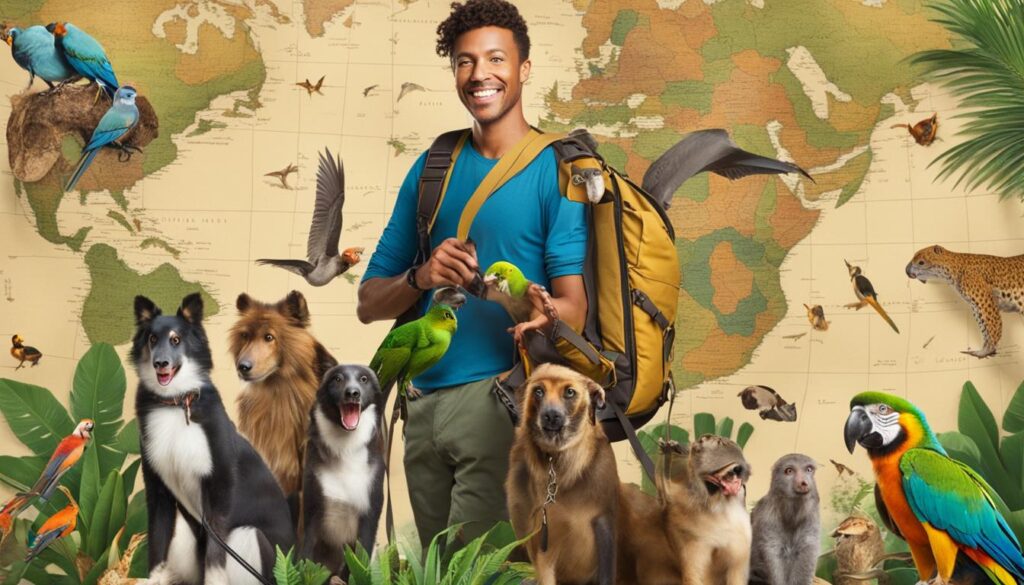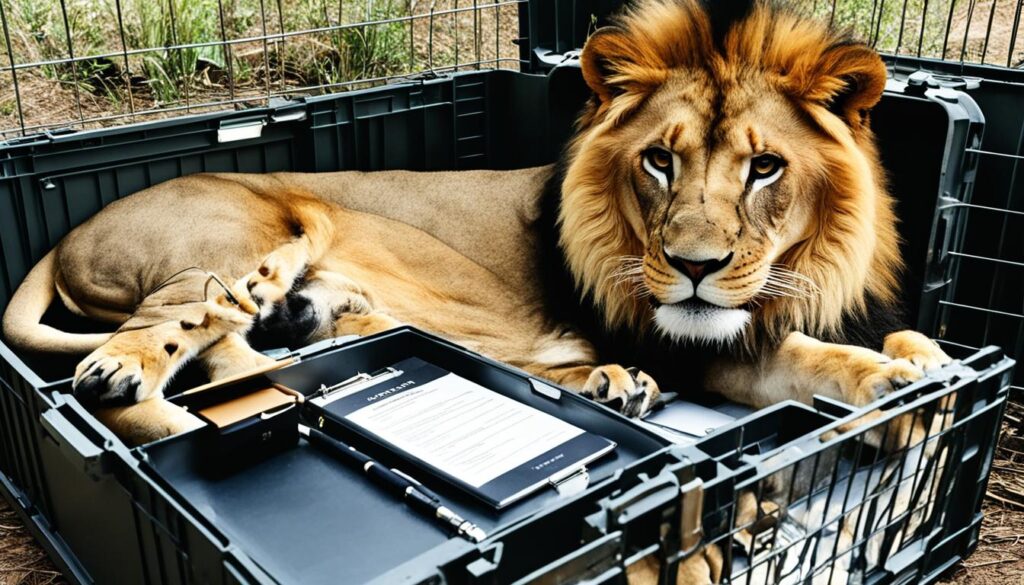Are you planning a trip with your exotic pet and want to ensure a smooth and stress-free journey? Look no further than our comprehensive guide for traveling with exotic animals. Whether you have a rare bird, a reptile, or a mini-pig, our tips and recommendations will help you navigate the logistics of traveling with unique pets.
From understanding exotic animal travel requirements to choosing the right mode of transportation, our guide covers it all. We will discuss how to prepare your exotic animal for travel, ensure proper nutrition and hydration, and manage their stress and anxiety during the journey. We will also emphasize the importance of complying with animal welfare laws and provide resources for exotic pet travel.
Whether you’re planning a road trip or an international excursion, our travel guide will give you the confidence to embark on an adventure with your exotic pet. Let’s start planning your unforgettable journey now!
Understanding Exotic Animal Travel Requirements
If you’re planning to travel with your exotic pet, it’s important to understand the travel requirements for your pet’s safety and comfort. International pet travel involves specific regulations and restrictions that must be taken into account. The following are some of the essential travel requirements for exotic animals:
Documentation
You will need to provide various documents when traveling with exotic animals, including health certificates and permits. Health certificates indicate that your pet is healthy and fit to travel, while permits allow you to bring your pet into the destination country. Make sure to research thoroughly and obtain all the necessary travel documents before embarking on your journey.
Health Certificates
Before departure, your pet must undergo a thorough health examination and be issued a health certificate from a licensed veterinarian. Your veterinarian can provide you with all the necessary information on what documentation you need based on the destination, type of pet, and specific requirements.
Permits
Permits for exotic animal travel vary from one country to another. You will need to check with the destination country’s embassy or consulate for specific guidelines on pet importation. Some countries require special permission for certain species of animals, and permits from both the country of origin and the destination may be necessary.
Tip: As regulations can change frequently, it is always best to check with the relevant authorities and experts to ensure your pet travel is compliant and legal.
Specific Regulations and Restrictions for International Pet Travel
There are specific regulations and restrictions for international pet travel that must be followed. For instance, some airlines prohibit certain types of animals from boarding. Others have restrictions on the age, weight, and breed of the animal. It’s essential to research these restrictions and regulations to ensure that you and your pet have a seamless and safe journey.
Travel Crates and Carriers
When traveling with exotic animals, travel crates and carriers are essential for their safety and comfort. The carrier should be comfortable, well-ventilated, and the right size for your pet, as per the specific species guidelines. Your pet should also have access to food and water during the journey.
Quarantine Requirements
Some countries require a quarantine period for pets to protect against the spread of infectious diseases. Find out if the destination country has a quarantine period or any other specific requirements you need to fulfill.
By understanding the requirements for exotic animal travel, you can ensure a safe and seamless journey for your unique pet. Research thoroughly, follow all regulations, and consult the experts on pet travel to make sure everything is in order.
Choosing the Right Mode of Transportation
Exotic animal transportation options are as diverse as the animals themselves. Depending on the type and size of your pet, some modes of transportation may be more appropriate than others. Here is an overview of the most common options:
| Transportation Mode | Pros | Cons |
|---|---|---|
| Air | Fastest option, able to cover long distances. | May be stressful for animals, strict regulations and documentation required. |
| Ground | Less stressful for animals, flexible scheduling options. | Slower option, limited distance coverage. |
| Sea | Lowest cost option, less stressful for animals. | Long travel time, limited availability to certain destinations. |
When selecting a transportation method, consider your pet’s needs and individual requirements. Larger animals may require a larger space and more attention from handlers. If traveling by air, research airlines’ specific regulations and restrictions regarding transporting exotic animals. Remember, your pet’s safety and comfort should always be the top priority.
Researching Pet-Friendly Travel Destinations
When traveling with pets, it’s essential to research and identify pet-friendly destinations. Look for places where accommodation providers, attractions and transportation options welcome your furry or exotic companion.
One way to find pet-friendly destinations is to check with pet organizations such as the American Kennel Club, The Cat Fanciers’ Association or exotic animal associations like the Zoological Association of America. You can also search online for pet-friendly hotels, restaurants, parks, and beaches.
Note: Before you start your research, ensure that you have the necessary permits, documentation, and health certificates to take your exotic animal to the destination of your choice.

Preparing Your Exotic Animal for Travel
Traveling with exotic animals can be a stressful experience for both you and your pets. To ensure a safe and comfortable journey, it is essential to prepare your pet adequately in advance.
The following tips can help you get started:
- Crate training: Practice crate training with your exotic animal to get them comfortable being in an enclosed space for extended periods.
- Acclimation to travel carriers: Introduce your exotic pet to their travel carrier before your trip so that they can get familiar with it.
- Managing comfort and safety: Ensure that your exotic pet has enough space to move around and lie comfortably during transit. Provide them with their favorite toys, blankets, and other familiar items to reduce travel anxiety and stress.
Additionally, it is crucial to follow any specific guidelines or regulations for your pet’s breed and species. Consult with your veterinarian for any necessary vaccinations, specific dietary requirements, and other health-related concerns.
By taking the time to prepare your exotic animal for travel adequately, you can ensure a smooth and comfortable journey for both you and your pets.
Ensuring Proper Nutrition and Hydration
When traveling with exotic animals, it’s crucial to ensure they have proper nutrition and hydration throughout the journey. Packing appropriate food, water, and supplies is essential for maintaining their health and wellbeing. Here are some tips on feeding and hydrating your exotic pet during travel:
- Bring enough food and water: Be sure to pack enough food and water for the entire journey, plus a little extra in case of delays. Make sure the food is appropriate for your pet’s species and age.
- Use a spill-proof container: Choose a spill-proof container for water to avoid accidents and dehydration. You might also consider adding an electrolyte solution to the water to replenish vital minerals.
- Feed before departing: Offer your pet a small meal a few hours before departure to avoid travel sickness. Make sure the food is easy to digest and unlikely to cause nausea or vomiting.
- Use food puzzles: Try using food puzzles or other interactive toys to provide mental stimulation and distraction during long journeys.
Keep in mind that different exotic animals have different dietary needs. Research your pet’s species and consult with a veterinarian before traveling to ensure you’re providing proper nutrition and hydration.
Tip: It’s also a good idea to pack some snacks and water for yourself to avoid any inconvenience during the journey.
Health and Safety Considerations
When traveling with exotic animals, it’s important to prioritize their health and safety. Vaccinations and parasite prevention are essential to ensure that your pet remains healthy throughout the journey. You’ll want to consult with your veterinarian prior to travel to verify that your exotic pet is up-to-date on all necessary vaccinations and treatments.
Additionally, it’s important to pack an emergency supply kit containing any necessary medications, along with first-aid supplies, grooming tools, and any other items your pet may need. In case of an emergency, always know the location of the nearest veterinary clinic or hospital.
Remember, traveling can be a stressful experience for exotic animals. Make sure to provide ample opportunities for rest, hydration, and comfort throughout the journey.
Veterinary Care at Your Destination
If you’re traveling to a new location, it’s recommended to locate veterinary care in advance, in case your pet experiences any health issues during the trip. You can conduct an online search for local veterinary clinics and hospitals or seek recommendations from your hotel or accommodation.
Note: Some destinations may have specific pet import regulations that dictate quarantine periods, health screenings, or other requirements. Be sure to conduct thorough research and adhere to all regulations to avoid any issues with your pet’s health or potential legal consequences.
Managing Travel Stress and Anxiety
Traveling with exotic animals can be a stressful experience for both you and your pet. To ensure a safe and comfortable journey, consider implementing strategies to manage travel stress and anxiety in exotic animals.
Create a Familiar Environment
Exotic animals may feel more comfortable and secure in a familiar environment. To replicate home as much as possible, bring along their favorite toys, bedding, and food. Additionally, consider setting up their travel carrier in advance and allowing them to explore and become familiar with it before the trip.
Use Calming Aids
Consult with your veterinarian to determine if calming aids such as pheromones or medications may be suitable for your exotic pet. These aids can help soothe and relax your pet during travel, reducing stress and anxiety.
Provide Mental Stimulation
Exotic animals may become bored or restless during travel, leading to stress and anxiety. To combat this, provide mental stimulation through interactive toys or treats, or engage them in activities such as training and playtime.
Compliance with Animal Welfare Laws
As a responsible exotic pet owner, it is essential to comply with animal welfare laws when traveling with your rare or wildlife pets. Not only does it ensure that you avoid any penalties, but it also helps to protect the animals’ welfare while on the move.
When traveling with rare animals, it is advisable to research your destination’s laws and regulations beforehand extensively. Different states and countries may have varying rules regarding specific species, and it is necessary to understand them before arriving.
It is important to note that some rare and exotic animals may be protected under international law, such as the Convention on International Trade in Endangered Species of Wild Fauna and Flora (CITES). You may need to obtain additional permits, depending on the particular species you are traveling with, to ensure compliance with these regulations.
Furthermore, it is crucial to take ethical considerations and conservation efforts seriously when traveling with wildlife. Always seek out reputable exotic animal transportation services that prioritize animal welfare and adhere to best practices in transporting rare and exotic animals.
| Tip | Description |
|---|---|
| Always research the laws and regulations of your destination for any specific requirements regarding your exotic animal transport. | This will help ensure smooth entry and exit from your destination and avoid any potential penalties. |
| Comply with international laws regarding rare animal species. | Some rare animal species are protected under international law, and you may need to obtain additional permits to ensure compliance with these regulations. |
| Choose reputable exotic animal transportation services. | Look for services that prioritize animal welfare and adhere to best practices in transporting rare and exotic animals. |
Overall, traveling with rare and wildlife animals requires careful attention to ethical and conservation considerations, as well as compliance with animal welfare laws. By doing so, you can ensure that your exotic pets have a safe and stress-free travel experience.
Handling Unexpected Situations
Traveling with exotic animals can be an exciting adventure, but it can also come with its fair share of challenges. It is essential to be prepared for unexpected situations that may arise during your travel. Here are some tips on how to handle them:
Flight Delays or Cancellations
Delays and cancellations are common in air travel, and they can result in extended wait times at the airport. In case of flight delay or cancellation, ensure that your exotic pet is comfortable and has access to food and water. It is also a good idea to have a contingency plan in place, such as an alternate flight or transportation method.
Health Emergencies
If your exotic pet experiences a health emergency during travel, seek veterinary care immediately. It is advisable to research veterinarians in advance of your trip and have their contact information readily available. Pack a first aid kit with essential supplies, such as medication, bandages, and antiseptics.
Legal Issues
Traveling with exotic animals requires compliance with various regulations and laws. If you encounter any legal issues, such as questioning by authorities, ensure that you have all necessary documentation and permits. Be respectful and cooperative with officials, and seek legal counsel if needed.
“Always be prepared for unexpected situations during exotic pet travel to ensure a safe and stress-free journey.”
Traveling with exotic animals can be a memorable experience, but it is important to be prepared for unexpected situations that may arise during the journey. By following these tips, you can handle unexpected challenges and ensure a safe and stress-free trip for both you and your exotic pet.
Resources for Traveling With Exotic Animals
If you’re planning to embark on a journey with your exotic pet, it’s essential to have all the necessary information and resources at your fingertips. Here are some helpful resources to assist you with your exotic pet travel and transportation needs:
- Pet Travel Services: Check out pet travel services such as United’s PetSafe to get information on transportation regulations, procedures, and pricing for exotic animal transportation.
- Veterinary Care: Before your trip, make sure you find a qualified veterinarian at your destination who can provide check-ups, vaccinations, and emergency care if needed.
- Government Websites: Visit the relevant government websites such as the Animal and Plant Health Inspection Service (APHIS) and the Centers for Disease Control and Prevention (CDC) for regulations and requirements concerning exotic pet travel.
- Animal Welfare Organizations: Contact animal welfare organizations such as the American Society for the Prevention of Cruelty to Animals (ASPCA) or the World Wildlife Fund (WWF) for guidance on responsible pet ownership and conservation efforts.
Before you travel with your exotic pet, do your research, and identify the resources that will be helpful in ensuring your pet’s safety and comfort throughout your journey.
Conclusion
Congratulations, you now have a solid understanding of what it takes to travel with exotic animals. Remember that it is essential to follow all regulations and guidelines to ensure the safety and well-being of your unique pets, as well as the safety of those around you.
Be sure to research your destination thoroughly to identify pet-friendly accommodations and attractions, and prepare your pet for travel by acclimating them to their carrier and providing proper nutrition, hydration, and mental stimulation.
Always prioritize your exotic animal’s health and comfort, and be prepared to manage any unexpected situations that may arise. Remember to comply with animal welfare laws and ethical considerations to ensure responsible pet ownership and conservation efforts.
By following these tips and guidelines, you can embark on a safe and enjoyable journey with your exotic animal companions. Have a great trip!
















































